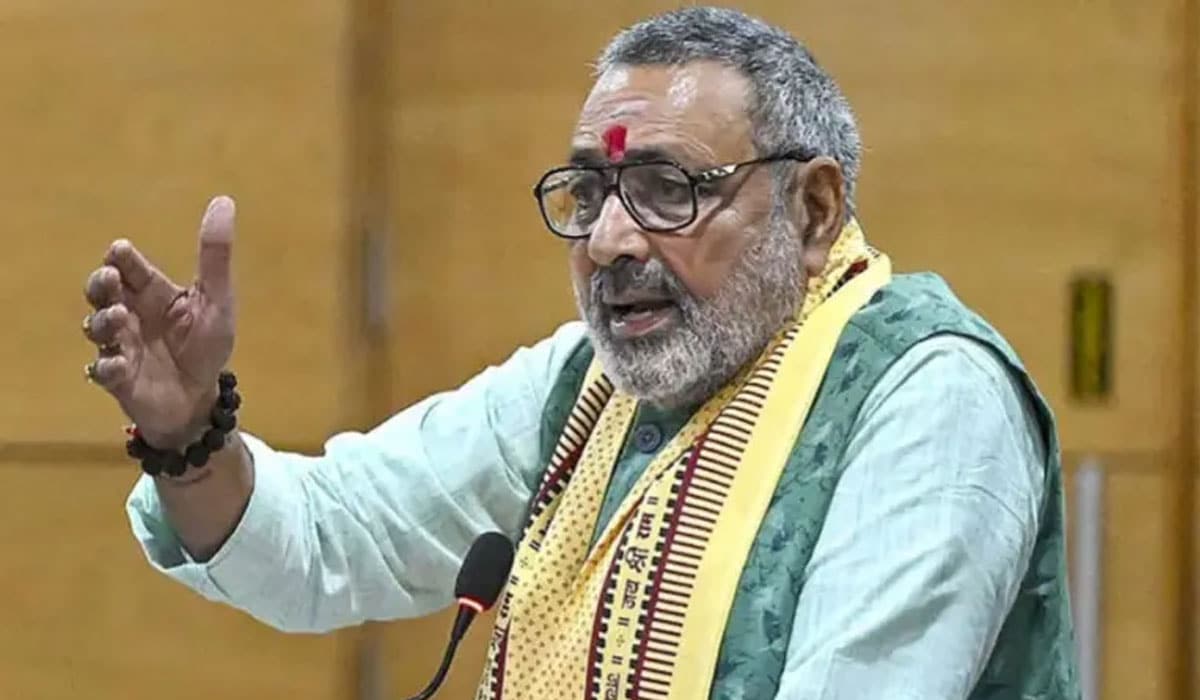Hyderabad Union Minister Giriraj Singh Claims Bangladeshi Nationals and Rohingyas Working as Delivery Agents
Hyderabad Union Minister Giriraj Singh Claims Bangladeshi Nationals and Rohingyas are working as delivery agents for food and e-commerce companies, sparking debates on security and employee verification.

Hyderabad: Hyderabad Union Minister Giriraj Singh Claims Bangladeshi Nationals and Rohingyas were employed as delivery agents by major food delivery companies and online shopping platforms. He further emphasized the need for their identification and appropriate action.
Speaking to PTI Videos on the sidelines of the NIFT-Hyderabad convocation event, Singh remarked, “The services sector, whether it is Zomato, Swiggy, or Flipkart, has delivery boys who are Bangladeshis and Rohingyas. Efforts should be made to identify them and hand them over to the police.”
Also Read:Elon Musk’s 2003 Video Goes Viral, Showcasing Early SpaceX Vision
Key Highlights from Giriraj Singh’s Statements
- Concerns Over Illegal Employment: Singh expressed concern about undocumented individuals allegedly infiltrating India’s service sector, particularly in delivery jobs.
- Call for Action: The minister urged companies and authorities to identify and take action against these individuals.
- Venue of Remarks: The statements were made during his visit to Hyderabad for the convocation of the National Institute of Fashion Technology (NIFT).
Hyderabad Union Minister Giriraj Singh Claims Bangladeshi Nationals Broader Political Context
Singh’s statements are part of ongoing rhetoric surrounding national security and illegal immigration. These comments come amid heightened political discourse about India’s borders and internal security.
Yogi Adityanath’s Controversial Comparison
Singh supported Uttar Pradesh Chief Minister Yogi Adityanath’s remarks comparing the activities of Mughal commander Babur’s general 500 years ago in Ayodhya and Sambhal to current events in Bangladesh. Adityanath had stated:
“The actions of Babur’s commander in Ayodhya and Sambhal 500 years ago are similar in nature to what is happening in Bangladesh today.”
Singh described Adityanath’s remarks as factual and defended them, highlighting shared “DNA” in the intent behind these acts.
Hyderabad Union Minister Giriraj Singh Claims Bangladeshi Nationals Criticism of AIMIM Leader Asaduddin Owaisi
The Union Minister also took a swipe at AIMIM President Asaduddin Owaisi, indirectly accusing him of harboring ideologies similar to those of Pakistan’s founder Muhammad Ali Jinnah. Singh said:
“India got divided in the form of Pakistan. Hindus got finished in Pakistan. The same thing is happening in Bangladesh today. Jinnah’s DNA was there in Pakistan, it’s in Bangladesh, and also in Sambhal. Even your Owaisi has inherited Jinnah’s DNA.”
What Do These Claims Mean for the Service Sector?
Potential Implications
- Increased Scrutiny of Employees: Food delivery and e-commerce companies might face regulatory pressures to verify the identities of their delivery personnel.
- Challenges in Verification: The alleged employment of undocumented workers highlights challenges in implementing comprehensive background checks.
Impact on Businesses
- Companies like Swiggy, Zomato, and Flipkart could find themselves at the center of this debate.
- Public trust in these platforms may also be impacted as questions about their hiring practices are raised.
Responses and Reactions
The statements have drawn mixed reactions from political leaders, industry representatives, and the public. While supporters see Singh’s comments as a necessary call to address illegal immigration, critics view them as politically motivated.
Political Responses
- Support for Singh: Many BJP leaders have echoed Singh’s concerns, tying the issue to national security.
- Criticism from Opposition: Leaders from opposition parties, including AIMIM, dismissed the remarks as divisive and aimed at polarizing voters.
Industry Response
So far, companies like Zomato and Flipkart have not issued official statements in response to the allegations. However, industry experts believe these claims could pressure businesses to implement stricter employee verification processes.
The Historical and Cultural Narrative
Singh’s remarks also delve into historical and cultural contexts, referencing:
- The Mughal invasion and its impact on Indian culture.
- Partition and its aftermath, which led to the division of Hindus and Muslims across India, Pakistan, and Bangladesh.
This narrative aligns with the BJP’s broader political messaging on preserving Indian culture and addressing perceived threats from neighboring countries.
Security Concerns in the Spotlight
The presence of undocumented workers has long been a contentious issue in India. Singh’s statements amplify concerns about:
- National Security: The alleged risks posed by undocumented individuals infiltrating sensitive sectors.
- Border Management: Calls for stricter controls along India’s borders with Bangladesh and Myanmar.
Call for Stringent Verification Measures
The minister’s remarks may reignite debates over implementing stricter employee verification measures across industries. Key recommendations include:
- Aadhaar Verification: Mandatory Aadhaar-linked identity verification for gig workers.
- Background Checks: Collaboration with police and intelligence agencies to verify employee backgrounds.
- Awareness Campaigns: Educating businesses about the importance of compliance with labor laws.
Public Opinion
Supporters’ Viewpoint
Many citizens believe Singh’s concerns reflect a genuine need to protect Indian interests. They argue that unchecked infiltration poses both economic and security risks.
Critics’ Viewpoint
Critics, however, see the remarks as part of a larger political strategy to polarize communities ahead of elections.
Conclusion
Union Minister Giriraj Singh’s claims about Bangladeshi nationals and Rohingyas working as delivery agents have sparked widespread discussion. These remarks, coupled with his support for Yogi Adityanath’s historical comparisons, highlight the interplay of national security, political rhetoric, and cultural narratives in contemporary India.
While the debate unfolds, businesses and authorities face increasing pressure to address these concerns through stringent verification measures and policy interventions. As public discourse evolves, the focus remains on balancing security needs with the ethos of inclusivity.

